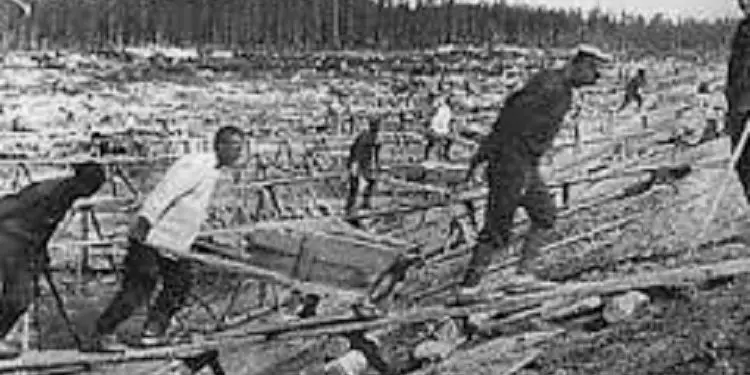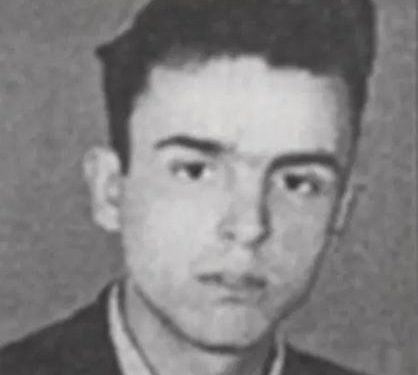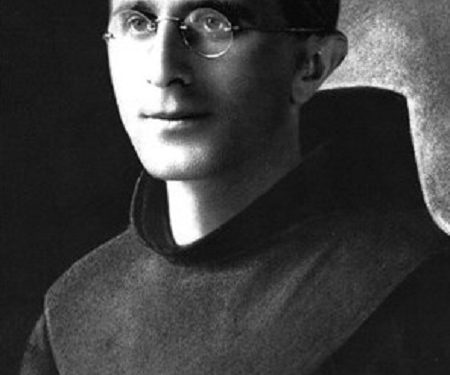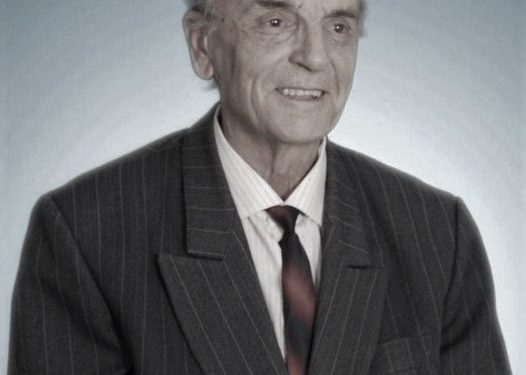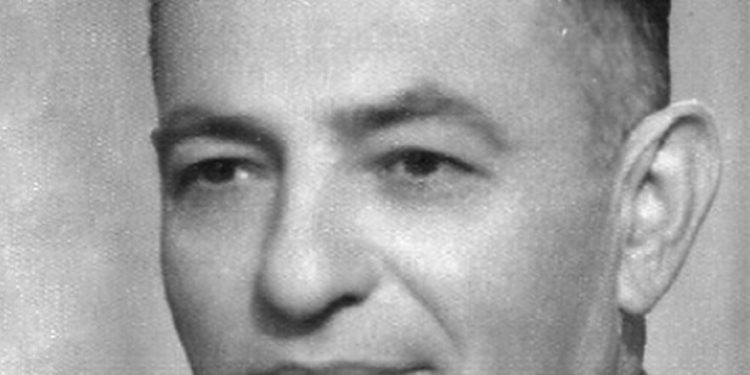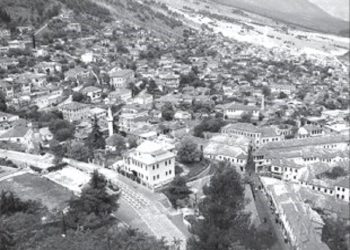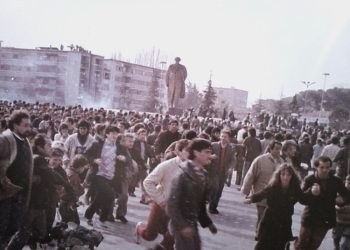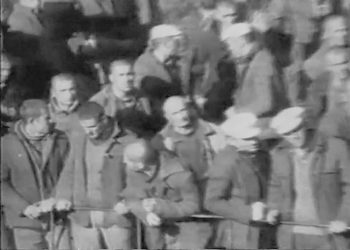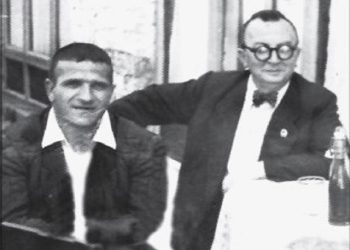By Reshat Kripa
The ninth part
Memorie.al / “Sometimes, when difficult trials fall on a child’s head from the earliest age in the secret recesses of his soul, a kind of scale is born, a beautiful scale, with which he weighs the affairs of this world . Feeling himself innocent, he submitted to his fate without making a sound. I didn’t cry at all. He, who has no reason to be scolded, does not scold others”!
(Viktor Hugo, “The Man Who Laughs”)
SHORTED YOUTH
Dedicated to family and society,
Author
VLASHUK
The work was difficult and with serious consequences. There were many accidents. The crane platform of beams and planks had just been completed. Vinçier was a young man, his name was Qemal. I don’t remember his last name. He was a smiling and humorous boy. He would be released in four months. Assembled the crane, put the counterweights on it and started to rotate it to test it. When they reached the outside of the platform, two planks that were not properly secured were lifted by the weight of the crane.
Qemali flew and fell into the canal from a height of more than ten meters. Immediately after him, the crane also fell, sinking him about one meter into the ground. Death was horrible. She had frozen his smile. We went down, dismantled the crane and took out the mutilated body. In the afternoon we buried him in the place designated for the dead, a few paces outside the enclosure, on the upper side of the camp. No one gave an account for this accident.
We were working on the excavation at the bottom of the canal. The depth had reached over twenty meters. Usually in the middle of the channel, we left a block of soil with dimensions of 80 X 40, without digging, to calculate the volume of the soil. Calculations were made every evening. You were obliged to fulfill the norm, otherwise you were left without the ration of bread and dinner tea. We called these blocks of earth pyramids. Its height had reached almost two meters.
Skender Dinia, the son of Fiqiri Dines, a well-known personality of Dibra province, worked at the end of the canal. He sat down next to such a pyramid and lit a cigarette. But fatigue and weakness caused her to escape from his hands and fall asleep. It leaned against the pyramid. The guard checking the prisoners was approaching. His friend saw him and called him:
– “Skender, get up, the guard is coming.”
In an attempt to get up, sleepy as he was, he was supported more forcefully by the haste. The pyramid collapsed. A terrible scream was heard. The ground had fallen on him. His friends tried to lift him up, but he could not move. He had great pain in his back. He had remained crouched. His friends took him with difficulty and placed him in a stall they made on the spot. They transported him to the camp infirmary.
Doctor Isufi, who had only been in Vlashuk for a few days, visited him and found that he might have broken the rings of the spine,. Poor Skender was paralyzed from the waist down. In between the pains, he asked the doctor:
– “Doctor, will I be able to escape without seeing my mother again”?!
His mother, along with other family members, was interned in Savër in Lushnje. The doctor knew there was no hope for him. However, he constantly encouraged him:
– “A few days will pass and you will get better.” You will go to the hospital and you will recover.”
They took him to Berat hospital only after three days. He waited a few more days and closed his eyes. We don’t know where they threw his body.
It was the beginning of March 1953. That day, Xhavit Çesma from Mokra, with whom we ate bread, approached and said:
– “Listen, these days a great event will happen. I have a premonition about this.”
– “Your mouth is full of honey! – said Myrtezai – maybe this one of ours broke his neck”!
It had become a habit for us to expect such an event every day. Well they say that hope dies last. She kept us alive. After a few days we received the news of Stalin’s death and a week later, that of the Czech dictator, Klement Gotvald. The joy in the ranks of the prisoners was great.
– “Who’s turn is it now, isn’t it ours?” – Xhaviti asked with a smile – Didn’t I tell you that I foresaw it”?!
Lieutenant Ademi understood from our faces what we were thinking.
– “It’s no use rejoicing that, in the event that the American imperialists dare to set foot on our land, you will be the first to disappear.”
– “You can’t wipe us all out”, – a voice was heard from the crowd.
– “Who spoke”? – asked the furious lieutenant.
The crowd fell silent. No matter how hard he tried, no one spoke. Finally, an ordinary spy told him about Xhavit. He took him and, after tying him up, sentenced him to a week in the dungeon. That month was a scene of terror for the camp.
A few years later, Xhaviti was released and exiled to Savër in Lushnje. From there he tried to escape to Greece, but was caught by the border forces and sentenced to death by firing squad. It was executed on a December night.
* * *
In May, my father and mother came to meet me. Liria was with them. At that time she lived in Peqin. Meetings were usually held on both sides of the barbed wire fence. Sergeant Lutfiu, one of the few guards with a good heart, was on duty that day. He felt sorry for me and kicked me out. I hugged all three of them longingly.
My father looked very old. He was sixty-one years old. Even the mother was very tired. They told me about Fatusha, who had been transferred to Bishan, a village in the Vjosa basin, and Agimi, who worked as a surveyor in Levan. When we parted, I followed them with my eyes until they disappeared at the turn.
One Sunday, while we were talking, Gjon Shllaku approached and said:
– “Boy, today we are organizing a literary competition in prose and poetry. On this occasion, we will also distribute two prizes to the winners. So paper and pencil and start”.
At school I was excellent at drafting. I always developed them in the form of a story. And that day, the idea of writing a poem struck me. Perhaps the poem that I had dedicated to Neri had an influence here. Nevertheless, I sat down and wrote the poem below:
Robert
“On every side and in every corner,
My dear Albania!
From Korça to the coast
You are in captivity.
Through terrifying prisons,
People suffer mercilessly.
They are oppressed, enslaved,
Why do they seek free life?
Through the bloody camps,
I feel angry and angry.
Albanian hearts suffer,
But the river has taken its own blood.
The farmer over there works,
It is torn very tired
He laboriously plows the field,
Even at night I can’t sleep.
Through the mountains goes the shepherd,
Along with his teeth,
The black man always suffers a lot,
After being in captivity.
Albania, my misery!
Why don’t you get up again?
To show that this time,
Freedom will soon come”!
Surprisingly, Myrtezai, who had a penchant for poetry, wrote a prose story. After a week we gathered again to do the prize distribution. Gjoni announced as the winner in prose a boy from Korça. He had written a very beautiful poetic prose about freedom. A boy from Dibra was declared the winner in poetry. Myrtezai and I were among the top ten that appeared in the competition. My pleasure was immense. I never expected such a thing. Perhaps it was more its content, than the value of the verses, that influenced in this direction. The prizes were two tobacco boxes made by an Italian craftsman. An eagle was engraved on the lid of each one and below it was written: LONG LIVE ALBANIA!
After a few days, John approached us and said:
– Young man, remember well what you have written, so that you don’t forget it and then take out the letters… They can be dangerous.
So we did. The poem stuck in my brain and remained so even after fifty-five years.
* * *
In July, the medical commission came from the Ministry. He usually came once a year. It was chaired by Dr. Miraka. Doctor Isufi had fabricated a false diagnosis for me as if I was suffering from tachycardia. The commission, which did not want to spoil the doctor, took me out with half the rate. This was a big help. We formed a team where we were all half normal.
One day Dr. Isufi told me:
– I thought about talking to the camp commander to get you into the kitchen. You will be better off there.
At first I was reluctant. All those who worked there were ordinary convicts. The doctor’s insistence and the respect I felt for him forced me to agree. That’s how I started. Working there was easy. Only he was on duty. We had a good guy from Dibra on our cook shift. He had entered prison after accidentally killing a friend of his when they were soldiers. I talked to him constantly; his conscience was killing him because of what had happened. I stayed away from others. They had entered for theft or rape. From their mouths you heard nothing but dirty talk. So pretty soon I started to get bored of that job. It’s just that it was hard for me to tell the doctor about it.
One day, a team from the Ministry of the Interior, headed by a first captain, came for inspection. They inspected the command, the guards and everything else. Finally he came to the kitchen. He started asking us in turn:
– Why are you punished?
Everyone was answerable for the filth they had committed. When it was my turn, I answered:
– Agitation and propaganda.
He looked me from head to toe. Something talked to the camp commander who was accompanying him and then he turned to me:
– And for whom did you campaign, sir, maybe for the Anglo-Americans?
I didn’t answer him right away. I was thinking. Finally, I decided to tell him the truth. I had been taught to hate servility.
– For Albania and Albanians!
– And for which Albanians, for those who betrayed the homeland and became tools of foreigners?
– For real Albanians. For those you killed, locked up in prisons or forced to flee overseas.
He blackened in the face and began to growl like a mad dog. He turned and left without saying a word. Lieutenant Ademi, who was there, looked at me angrily and said,:
– I’ll show you the fun!
He took a pair of irons, tied my hands, squeezing them as hard as you could. Then he locked me in the cell that was for this purpose. Surprisingly, in the evening they also brought Hysniu, Burimi, Kliton Dino, Ahmet, Myrtezana and Jorgo. This was the greatest absurdity that could exist. Why should they be punished for my fault? Or why they were my closest friends? They also tied them like me.
Hysniu, with his temperament, couldn’t stand it when he saw my hands swelling from the grip of the bars and called out:
– You are mean. Do the irons tighten like that in the hands of a kalamak? Squeeze me and free him!
– Rest Enter, don’t talk! – I said in a low voice to calm him down.
The guards entered the cell and tightened the bars on us. They left us without food for two days. After a week, they untied our hands and sent us to work. They were swollen and blackened from lack of blood circulation. They took away my six hours and sentenced me not to meet my family for six months.
* * *
We were returning to the camp from work. Several cars were parked in front of the gate.
– They brought another contingent, – said Myrtezai
Indeed, in the middle of the yard, there were many young prisoners. Besnik was among them. I was overjoyed. It seemed to me that the whole family had come to me. I could talk about things with him that I couldn’t do with other friends. Anyone who has experienced the absence of a family understands my feeling at that moment.
There was an empty seat next to my bed. A convict from Kukësi was released a few days ago. I tried to put Besnik in that place. I told the captain but he refused. In his place, he brought me a man in his forties, one of those who had just arrived. Outwardly he looked like a serious and civilized man.
– Welcome! I believe that we will have a good time together, – I told him.
– Of course, we have nothing to share here – he answered.
I was much younger than him and I didn’t know what to say to him. He was arranging his clothes, and you could tell by the care he took in them that you were dealing with an intellectual.
– Where are you from? – I continued with my ignorance.
– I am from Korça and my name is Sadik Shkëmbi. But you, my boy, have a bit too much chatter.
I remained silent, embarrassed. Had I said any words that should not have been said? He arranged his clothes and turned to me saying:
– Where are you from? Why did they let you in?
– I am from Vlora. My name is Reshat Kripa. I have been arrested for agitation and propaganda, – I answered with satisfaction that he had agreed to talk with me.
– What kind of agitation did you do?
– Distribution of tracts around the city.
– Would you overthrow the government with tracts? Stop it, stop it, don’t talk to me about how these people have ruined this country, even God himself can’t fix it.
Shut up. I sat and did not dare to speak. I don’t know why, but with his presence he had gained an authority over me.. After sitting a little, he began:
– However, I know that you are still worried, that’s why I’m telling you. I am a professor of literature. I graduated from Sorbonne University in France. I was a teacher at Korça High School. Since I was in university, I met Neta. She studied psychology. We fell in love and when we returned to Albania we got married. To tell you the truth, I did not like the way the communists took power. Not even the medieval methods they used against the intelligence inherited from the past. I felt that the same method was used against me. They took advantage of a completely absurd case and fired me. I had left the son of a Party Committee functionary in the classroom. I opposed this decision with my reasoning. In an instant I lost control and used an expression that was later used against me. But I think they were actually fighting me as an intellectual who had studied in the west. I was arrested on charges of agitation and propaganda and sentenced to ten years in prison. At home I left my wife, who was also fired from her job and now works in the agricultural enterprise, and my only daughter, my beautiful Violet like spring.
He stood and was looking at me carefully.
– How old are you?
– Eighteen.
– It was an age with my Violet. Continues the last year of high school. She is an excellent student. I’m sorry that I was the cause that prevented him from moving on.
We didn’t last much longer. Vjollca’s case reminded me of my class. They were also in their last year of high school. Neri was among them. There can be no more difficult moment than when you remember your good company in moments of spiritual suffering. From that moment, despite our age difference, we became good friends with Sadik. In this direction, the good opinion that Besnik gave me about him also influenced.
At the end of November Jorgua was released as a result of an amnesty that took place that year. They gave him six months. Myrtezai and I still had half of the sentence to serve./Memorie.al




